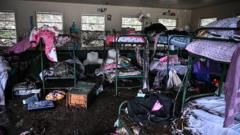As survivors and families mark the 80th anniversary of the liberation of Bergen-Belsen, poignant memories of suffering and death resurface, reminding the world of the camp's devastating legacy.
Eighty Years Later: Remembering the Atrocities of Bergen-Belsen

Eighty Years Later: Remembering the Atrocities of Bergen-Belsen
Survivors and families gather to honor lives lost and recount horrors of the Nazi concentration camp.
Eighty years have passed since the liberation of Bergen-Belsen, yet the echoes of its dark history remain deeply engraved in the memories of survivors and their families. In a solemn commemoration held on Sunday, over a thousand attendees, many connected to those who suffered within the camp’s walls, gathered to remember the tens of thousands who perished at the hands of the Nazis.
When British and Canadian troops arrived at Bergen-Belsen in April 1945, they encountered a hellish scene—13,000 unburied bodies and 60,000 emaciated survivors struggling for life amidst the remnants of horrific cruelty. Survivor Mala Tribich, who was only 14 at the time, recalled the overwhelming sorrow and despair, describing Bergen-Belsen as "a place of skeletons."
The event not only served as a memorial but also as a vital reminder of the atrocities committed during the Holocaust. Survivor Esther Alice recounted her heartbreaking experience of losing her mother to the camp's brutal conditions, a memory that continues to haunt her.
Unlike camps further east, which were destroyed in a bid to conceal their crimes, Bergen-Belsen remained intact at liberation, laying bare the horrors that unfolded there. Notably, there were no gas chambers in Bergen-Belsen; the causes of death were rampant disease and starvation, with death tolls soaring to around 500 per day in the final weeks of the war.
As the commemoration unfolded under the spring sun, the juxtaposition of serene nature against the backdrop of such a ghastly history served as a chilling reminder of the atrocities endured. Dignitaries, including Deputy Prime Minister Angela Rayner and UK Chief Rabbi Sir Ephraim Mirvis, participated in honoring the victims, laying wreaths to commemorate their lives.
A visitor center now stands as a testament to those lost, surrounded by the quiet landscape that once bore witness to unimaginable suffering. "Here rest 5,000 dead," reads one of the memorial inscriptions, echoing the memories that refuse to fade and ensuring that the lessons of Bergen-Belsen are never forgotten. As the world continues to grapple with the vast lessons of the Holocaust, the stories told on this anniversary remind us of the resilience of the human spirit even amidst profound suffering.






















